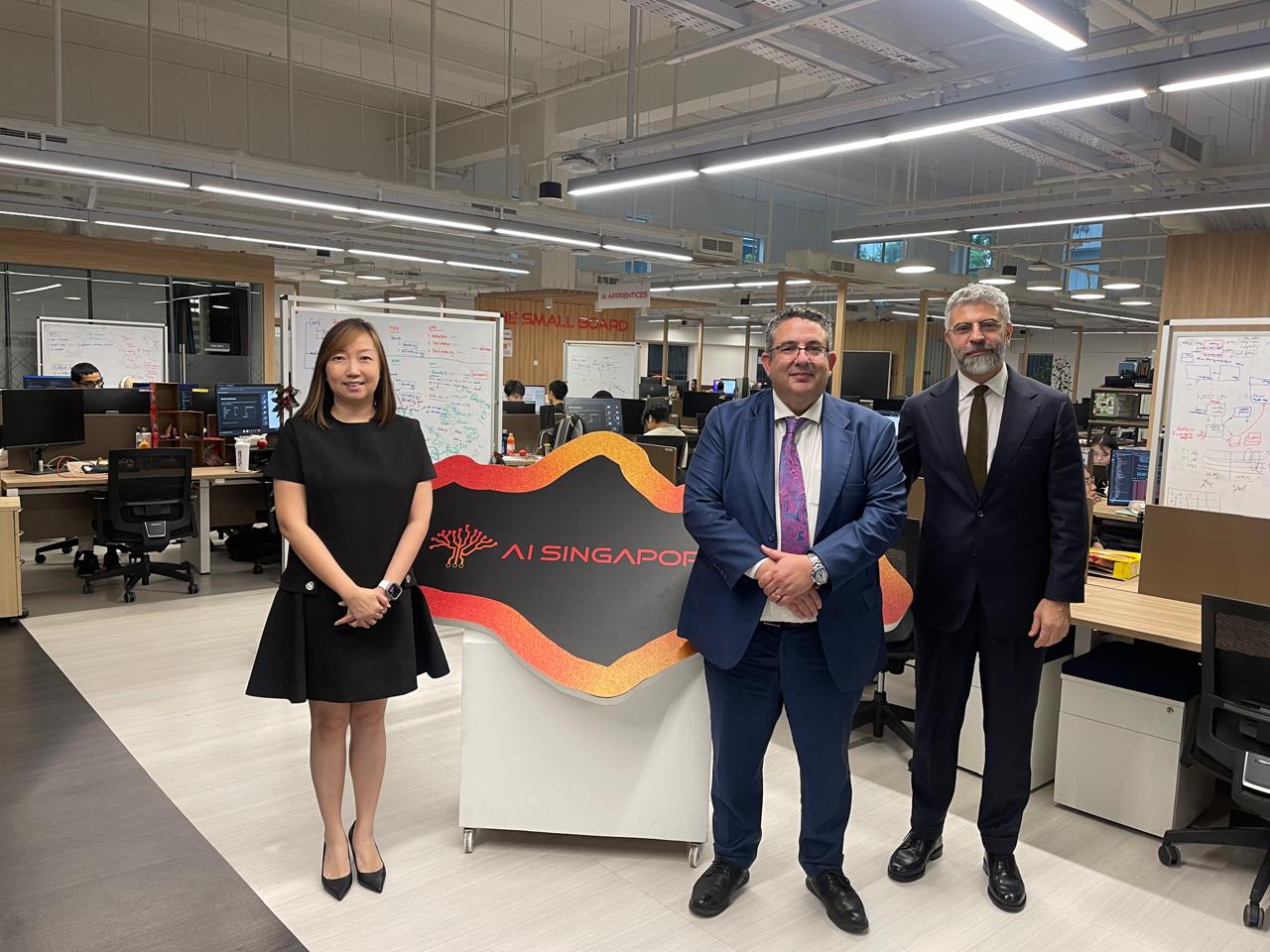Cyprus Chief Scientist Demetris Skourides, joined by High Commissioner Nikos Panayiotou, concluded a week of strategic meetings in Singapore, strengthening partnerships and exploring AI policy frameworks to position Cyprus as a regional innovation hub by 2035.
The visit included participation in the Asia Innovation AI Summit 2024, organised by The Economist, and high-level discussions showcasing Cyprus’ Research and Innovation (R&I) ecosystem.
The initiative comes as Cyprus prepares to review its National AI Strategy 2020–2025, aiming to become a global leader in technology, innovation, and research under Vision 2035.
During the summit, held from November 27 to 30, Skourides and Panayiotou engaged with prominent global figures in artificial intelligence, including Singapore’s Minister for Digital Development and Information, Josephine Teo, and Japan’s Assistant Vice Minister for International Affairs, Yoichi Iida.
Other key participants included Andrea Phua, Senior Director of Singapore’s National AI Group; Jacqueline Poh, Managing Director of the Singapore Economic Development Board; and Jason Grant, Director of the Centre for AI and Data Governance at SMU Urban Institute.
Representatives from leading global companies, including Canva, Google, and AWS, also contributed to discussions.
The event highlighted Singapore’s active promotion of AI through policy initiatives and investments, including its Model AI Governance Framework, which balances innovation with ethical considerations. Japan’s Hiroshima AI Process, focused on risk-based agile regulation and international guiding principles, was another focal point.

“AI is a strategic enabler for science, drug discovery, and industry,” Teo noted, emphasizing Singapore’s AI ecosystem of more than 1,100 startups and 150 R&D teams.
Singapore’s efforts to train 15,000 AI specialists and leverage its 300GW AI data centre infrastructure were presented as models for societal and economic transformation.
Japan’s multistakeholder approach, fostering innovation while managing risks, provided additional insights for Cyprus as it refines its AI governance framework.
In discussions with Gustavo Fuchs, Global Head of AI Infrastructure at Google, Skourides explored private cloud AI capabilities, data privacy, and GDPR compliance.
He also exchanged views with Eleni Dimokidis, AWS Head of Healthcare Technology APAC, on the use of AI in public healthcare, focusing on diagnosis, prediction, and personalized treatments.
Skourides commented, “Adopting technologies like AI is no longer optional but requires a robust strategy to transform citizen and customer experiences. Cyprus must establish foundational systems, as plug-and-play solutions are insufficient.”
The Cypriot delegation was hosted by Sintia Teddy-Ang, Senior Executive at AI Singapore, who outlined the country’s progress in AI adoption since launching its national program in 2017.
AI Singapore has engaged over 300 companies, initiated 60 projects, and developed 100 experiments, primarily in healthcare and finance.
The AI Makerspace platform, launched in 2019, was presented as a tool for SMEs to access AI technologies, open data, and pre-built solutions. Programs like AI4Industry and AI SG PhD were also discussed, with plans to exchange best practices with Cyprus’ Research and Innovation Foundation (RIF).
Strategic meetings extended to global investors, including Ashok Mirpuri, Head of International Policy and Governance at Temasek International, a $389 billion investment company managing 700 portfolio firms.
Moreover, Skourides showcased Cyprus’ innovation index, technological strengths, and startup mobility, presenting opportunities for investment in Cypriot R&D companies.
John Lim, CEO of the National Research Foundation of Singapore, detailed Singapore’s Research, Innovation, and Enterprise (RIE) 2025 strategy, organized around four domains: Manufacturing, Trade and Connectivity, Human Health and Potential, and Urban Solutions and Sustainability.
Lim emphasised that RIE underpins Singapore’s knowledge-based economy, fostering competitiveness through cross-cutting pillars of academic research, manpower development, and enterprise innovation.
Additional discussions were held with Chew Lock Pin, Executive Director of the Science and Engineering Research Council at ASTAR, regarding the integration of public-private partnerships to advance Industry 4.0 technologies.
Topics included environmental sustainability and climate change, with opportunities for Cyprus to align its initiatives with global trends.
The delegation also explored collaboration with ASEAN SCALE HUB, led by CEO Ashish Kapashi, to facilitate bi-directional opportunities for Cypriot startups entering Southeast Asia and ASEAN startups establishing a European presence via Cyprus.
Skourides welcomed participation in the ASEAN Scale Hub Initiative, citing its potential to unlock access to a $10 trillion market by 2030.
Skourides and Panayiotou were hosted by Dimitris Angelaki, Lead Researcher at the Centre for Quantum Technologies at the National University of Singapore.
Angelaki provided insights into Singapore’s quantum computing initiatives, which focus on building clusters of startups for commercialization.
Oracle ASEAN Vice President Ek Goh highlighted how hyperscaler technologies are reshaping industries and creating new opportunities for companies.
The visit concluded with a meeting with a tier-2 Indian system integrator, which expressed interest in establishing a presence in Cyprus to support research growth while complementing its operations in London, Dubai, and New York.
“These partnerships are critical to accelerating Cyprus’ research excellence and creating sustainable growth,” Skourides said.
He added that “Cyprus’ collaborations with Japan, Israel, the USA, and Singapore are instrumental in realising Vision 2035”.
In addition, he explained that strategic alliances are not only transformative but essential for positioning Cyprus as a regional hub for innovation.
The next steps include follow-up engagements in early 2025, focusing on partnerships with research organisations and innovation companies, and Cypriot participation in GITEX Asia 2025.
Finally, Skourides expressed confidence that Cyprus will soon host its first quantum computing startup, reflecting the success of its growing global network.







Click here to change your cookie preferences